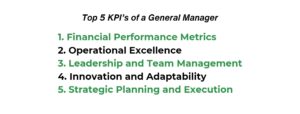In the dynamic landscape of modern business, the role of a General Manager (GM) is both challenging and pivotal. The effectiveness of a General Manager is often measured by a set of Key Performance Indicators (KPIs) that go beyond mere financial metrics.
This blog explores the Top 5 KPIs that drive the success of a General Manager.
1. Financial Performance Metrics
A) Revenue Growth:
The heartbeat of any business, revenue growth is fundamental. A General Manager must strategize and implement initiatives that contribute to the steady expansion of the organization’s top line.
B) Profit Margins:
Efficient cost management and revenue optimization directly impact profit margins. A General Manager is tasked with maintaining healthy margins while ensuring sustainable business operations.
C) Return on Investment (ROI):
Evaluating the return on investments provides insights into the effectiveness of capital allocation. A high ROI indicates that resources are being utilized efficiently to generate value.
2. Operational Excellence
A) Operational Efficiency:
Streamlining processes and workflows is critical. KPIs related to operational efficiency measure the effectiveness of these efforts in reducing costs and enhancing productivity.
B) Customer Satisfaction:
Satisfied customers are the lifeblood of any business. Monitoring customer satisfaction KPIs reflects the success of customer-centric initiatives.
C) Quality Metrics:
Ensuring the quality of products or services is vital for long-term success. KPIs related to quality control and defect rates are paramount indicators of a General Manager’s commitment to delivering excellence.
3. Leadership and Team Management
A) Employee Engagement:
A motivated and engaged workforce is a key asset. KPIs measuring employee satisfaction, retention rates, and productivity reflect the effectiveness of a General Manager’s leadership.
B) Leadership Development:
Fostering a culture of continuous learning and leadership development is crucial. KPIs related to employee skill development and leadership progression showcase the long-term vision of a General Manager.

4. Innovation and Adaptability
A) Innovation Metrics:
Staying ahead in a competitive landscape requires constant innovation. KPIs related to research and development, new product launches, or innovation adoption rates gauge a General Manager’s commitment to staying at the forefront of industry trends.
B) Adaptability to Change:
The ability to navigate and lead through change is a hallmark of effective management. KPIs related to successful change implementation and employee adaptability highlight a General Manager’s agility.
5. Strategic Planning and Execution
A) Goal Attainment:
Setting and achieving strategic goals is fundamental. KPIs measuring goal attainment provide a tangible metric for success.
B) Market Expansion:
Evaluating the success of market expansion initiatives is crucial for growth. KPIs related to market share and penetration assess a General Manager’s ability to position the organization strategically.
Conclusion
In the intricate tapestry of a General Manager’s role, Key Performance Indicators serve as the compass guiding the journey toward organizational success.
By focusing on financial performance, operational excellence, leadership and team management, innovation, and strategic planning, a General Manager can exceed the expectations of stakeholders.
The ability to navigate and thrive amidst the complexities of modern business relies heavily on a General Manager’s mastery of these KPIs, ensuring sustained growth and prosperity for the organization.






